In Portugal, Fiocruz president strengthens partnerships and is received by authorities
20/05/2022
Vilma Reis (from Portugal to Fiocruz News Agency)
On a six-day trip to Portugal, the president of the Oswaldo Cruz Foundation, Nísia Trindade Lima, was received by 14 Portuguese authorities, including three ministers, two rectors, an ambassador, and directors and presidents of institutions involving health, education, technology, and innovation, to deepen and structure inter-institutional cooperation between Fiocruz and Portuguese organizations. The trip took place between the last week of April and the first week of May this year.
The Fiocruz delegation visited the universities of Aveiro and Minho, the Center for Product Engineering and Development (CeiiA), the São João Hospital, the 4LifeLab hub, the General Direction of Health, the Brazilian Embassy in Portugal, the National Public Health School (ENSP), the Dr. Ricardo Jorge Health Institute (INSA), the Institute of Hygiene and Tropical Medicine, the Community of Portuguese Language Countries (CPLP), the Infarmed - National Authority of Medicines and Health Products, and the ministries of Foreign Affairs; Science, Technology and College Education; and Health.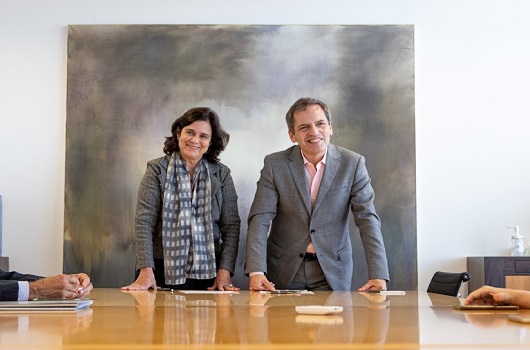
Nísia Trindade Lima and Paulo Jorge Ferreira University of Aveiro (Image: University of Aveiro)
In Aveiro, a partnership in an international platform
Aveiro was the first city to welcome the Foundation’s delegation, on Wednesday, April 27. Lima was welcomed by the rector, professor Paulo Jorge Ferreira, and by the vice-rector, João Filipe Veloso, to sign the addendum to a 2021 agreement, for the creation of the International Platform for Science, Technology, and Innovation in Health.
As the agreement was being signed, Lima emphasized the reason for the visit: “The goal is to expand all fields of actuation of sciences, technology, innovation, and education. I would like to emphasize once again how important this cooperation is for us. Brazil and Portugal have in common the articulation of these scientific fields articulated with their universal health services, and we will be able to mutually develop more and better actions.”
The Fiocruz delegation visited the Research Unit, the Research Center for Ceramic and Composite Materials at the University of Aveiro (Ciceco), and the Biomedicine Institute (Ibimed). The visit included the Fiocruz space within the PCI - Creative Science Park, an innovation hub that includes the International Platform for Science, Technology and Innovation in Health (PICTIS), the starting and anchoring point for innovation projects in various areas of knowledge and technologies for health.
The second day of the trip involved visits and meetings at the Center for Engineering and Development (CEiiA), with headquarters in Matosinhos, and at the São João Hospital, in Oporto, one of the country’s largest hospital complexes. At the CeiiA, the delegation got to know and observe the technological experience applied to some ongoing projects at the 4LifeLAB, a collaborative laboratory for knowledge and technology for health that has Fiocruz, through the Paraná Institute of Molecular Biology (IBMP), as one of its founding partners. In the afternoon, at the São João Hospital, Lima was received by professor Fernando Araújo, president of the hospital’s Administrative Board, and participated in the presentation of the project that uses drones as the newest means to transport urgent medicines or advanced life support equipment.
Open Science at Minho
At the University of Minho, Lima met the vice-rector for Research and Innovation, Eugénio Campos Ferreira, and the director of the university’s Documentation and Library Services, Eloy Rodrigues. The meeting addressed the cooperation between the two entities in the last decade, especially in Open Science, and a possible partnership for activities involving validation of diagnostic tests as well as the establishment of a partnership within the European Infrastructure for Research in Microbial Resources, with headquarters at the University of Minho.
On the same Friday, April 29, the General Director of Health, Graça Freitas, a Portuguese doctor who specialized in public health, received the president of the Oswaldo Cruz Foundation at a meeting that addressed issues such as the fight against the COVID-19 pandemic, surveillance, and the adaptation required by the society and by the health services. In addition to Lima, the meeting was also attended by Fiocruz vice-president, Mário Moreira, and by Rui Portugal, sub-director of Health in Portugal.
Graça Freitas presented an outline of the DGS’s (General Health Direction) work in the past two years and admitted that in the first two decades of the 21st century the country had been working as if it was still in the 20th century: “We moved into another century and into another millennium, and yet our methods have not been modernized accordingly. However, the pandemic has forced us to provide other answers and to do things that were not part of our routine. One of these things was bigger and better cooperation between governmental institutions, the private sector, and the society,” explained Freitas.
Schools network
Pharmacist Rui Santos Ivo, Infarmed president, received Lima in the afternoon of May 3. Infarmed is Portugal’s Government Agency of Public Health Surveillance; it recently included the AstraZeneca vaccine against COVID-19 manufactured by Fiocruz in its list of vaccines accepted for the issuing of the EU Digital Certificate. Among the issues addressed was the Foundation’s agenda regarding the development of products in Portugal and the stimulation of co-production within collaborative laboratories. “We will soon have changes on how we evaluate some technological products. If during this moment of alterations we can rely on the technical support of Infarmed, with its vision and experience in laboratory and regulatory techniques, it will the chance for amazing growth in health in Brazil,” said Lima.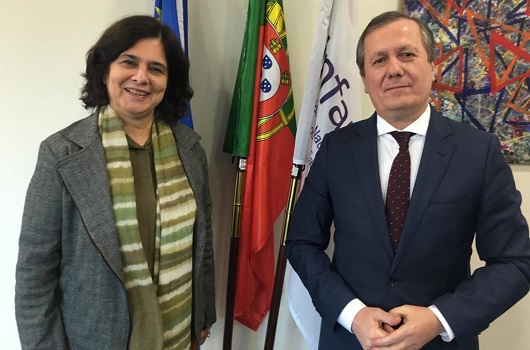
Nisia Trindade Lima and Rui Santos Ivo, Infarmed's president (Photo: Vilma Reis)
At the Institute of Hygiene and Tropical Medicine, at Universidade Nova de Lisboa, in Lisbon, the Fiocruz delegation was received by director Filomeno Fortes, a professor from Angola and a specialist who is very respected in Portugal for his experience as well as for the dynamic drive he has been giving this institution. The IHMT (its acronym in Portuguese) is a worldwide reference in teaching and in the research of tropical diseases, and which celebrated its 120th anniversary in April. The meeting addressed the recent visit of a WHO team to assess the preparation of the Portuguese health system to fight emergency situations, as well as current global health issues. Subdirector Miguel Viveiros asked for Fiocruz’s support for the recently approved master’s degree in Entomology, the first in Portugal, created by the IHMT.
Lima also meet with Sónia Dias, director of the National Public Health School of Universidade Nova de Lisboa (ENSP-NOVA), with whom she talked about the Ibero-American Network of Schools and Centers for Public Health. The goal of the Network is to strengthen teaching, research and partnership with the community in the sector, aiming to improve the quality of life and of the health of the Ibero-American population, in accordance with sustainable development goals. An Action Plan will be developed, and the role of the executive secretary’s office of the Network will belong to Fiocruz’s National School of Public Health for two years.
Agreement with INSA and meeting with ministers
The Doutor Ricardo Jorge National Health Institute (INSA) and Fiocruz signed, on May 2, a protocol for international cooperation that intends to develop and strengthen the partnership between the two institutions in the areas of Science, Technology, and Innovation, at a ceremony presided by the assistant secretary of State and Health, António Lacerda Sales, and accompanied by the Foundation’s president and by INSA president, Fernando Almeida. With the celebration of the agreement, activities will be developed to obtain innovative products, processes and services and to transfer and share knowledge and technology. The agreement will also make it possible to raise funds from international sources to develop these processes and to foment post-graduation training through its own academic resources.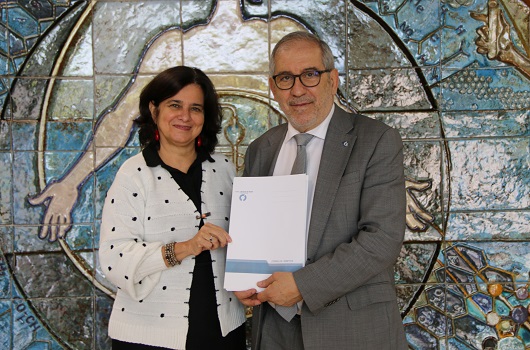
The agreement signed with INSA intends to develop and strengthen the partnership between the two institutions in the areas of Science, Technology, and Innovation (Photo: Vilma Reis)
On Tuesday, May 3, Lima met with two ministers: Elvira Fortunato, of Science, Technology and Higher Education, and Marta Temido, of Health. The strengthening of the cooperation in science and health was the focus of the meeting between Fortunato and Lima. The minister proposed the creation of a wider protocol to qualify various Portuguese health institutions to cooperate as a network in priority areas still to be defined.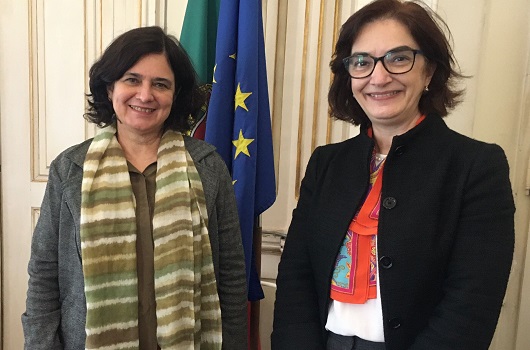
The strengthening of the cooperation in science and health was the focus of the meeting between Fortunato and Lima (Photo: Vilma Reis)
From the lunch with Temido and with António Lacerda Sales, assistant secretary of State and Health, Lima highlighted the minister’s concerns regarding challenges posed to the SNS, the Portuguese national health service, considering the period of the pandemic and its impact on other health services, in addition to the policy of access to medicines:
“We also talked about the importance of social participation in health systems in a more proactive fashion, and she even mentioned Brazil’s example, with its partnerships with Conass [National Council of Health Secretaries] and Consasems [National Council of Municipal Health Secretaries]. At the end of the event, she told of a trip to Rio de Janeiro, in 2018, when she was sub-director of the Institute of Hygiene and Tropical Medicine and visited the Drug Technology Institute (Farmanguinhos/Fiocruz). On the occasion, she met representatives of the unit in order to strengthen relations, and she also mentioned her participation at the preparatory meeting for the 12th Brazilian Congress of Collective Health (Abrascão), which took place at the University of the State of Rio de Janeiro”, summarized Lima.
On the last day of the trip, Wednesday, May 4, the Fiocruz delegation was received by minister João Gomes Cravinho, of Foreign Affairs, who heard from Lima a summary of her visit to Portugal. The highlight of the visit was the strong increase in cooperation between Fiocruz and different Portuguese institutions: “Fiocruz is really ongoing an internationalization process, and this trip emphasized the urgent need to build a future Portugal-Brazil cluster in the health sector,” said Cravinho.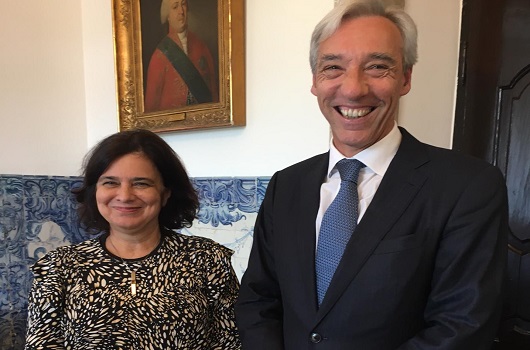
The highlight of the meeting with the minister Cravinho was the strong increase in cooperation between Fiocruz and different Portuguese institutions
Also on May 4, Lima visited the Community of Portuguese Language Countries, where she attended a meeting at the headquarters of the organization, in Lisbon, with the general director, ambassador Armindo de Brito Fernandes, and with the cooperation director, Manuel Clarote Lapão. The goal was to strengthen cooperation between the two institutions as well as the public health systems of Portuguese-speaking African countries, and to create the São Tomé e Príncipe Institute. Fiocruz has held a Consultative Observer status since the 12th Ordinary Meeting of the CPLP Council of Ministries, which was held in Lisbon in 2007.
Delegation
In addition to president Nísia Trindade Lima, the Fiocruz delegation also included Mário Moreira, vice-president of Institutional Development and Management, and Félix Rosenberg, director of International Cooperation. During their visit to the University of Aveiro, the group was also joined by the director and the vice-director of the Oswaldo Cruz Institute (IOC/Fiocruz), Tânia Araújo-Jorge and Luciana Garzoni, respectively; the director of the Paraná Institute of Molecular Biology, Pedro Barbosa; and researchers José Luís Cordeiro, of Fiocruz Ceará, Jorge Magalhães, of the Drug Technology Institute (Farmanguinhos/Fiocruz), and Roberto Ferreira, of IOC/Fiocruz.


